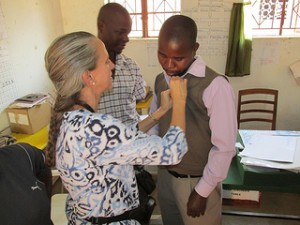
It is not uncommon to see classrooms with one teacher, and well over a hundred students.
It is not surprising to see students with no paper and pencil with which to take notes. The teacher has no video equipment to stimulate learning.
In many places classes take place without even a formal classroom. Under that tree, is often the description of the place where a particular class meets. It is a simple clearing, or a make shift thatched roof hanging pre-cautiously over a few bent poles. It serves as the only shelter from torrential rains, unbearable burning hot sun, or insects that torment the students as they sit on the hard ground for hours at a time.
Add to the other difficult conditions the problem of low pay, and little recognition for the goals they are trying to reach.
Children in Malawi are eager to learn and often walk for miles to get to school in the morning, then miles back home at night. They deserve better than they are receiving.
During the 2013 Mission Trip by the Western HIlls Church of Christ in Austin, Texas several stops were made at schools in the central and southern part of Malawi. Part of the reason was to see first hand the distribution of a portion of the 33,000 text-books the Western Hills church sent to Malawi. Another reason was for Leah Read, a school teacher in Austin, to have the opportunity to pass out teaching supplies to the teachers and to compliment them on the work they are doing. Dick Stephens, of the Malawi Project, noted: “The smiling, pleasant, appropriate expressions on the faces of Malawi teachers, when Leah pinned a reward pin to their lapels said it all. Most have probably never received such recognition, and for a teacher to travel all the way from America to compliment them was something they could hardly imagine. It was a moment of great encouragement every time Leah addressed a group of teachers. She was a great addition to the 2013 mission team.”
